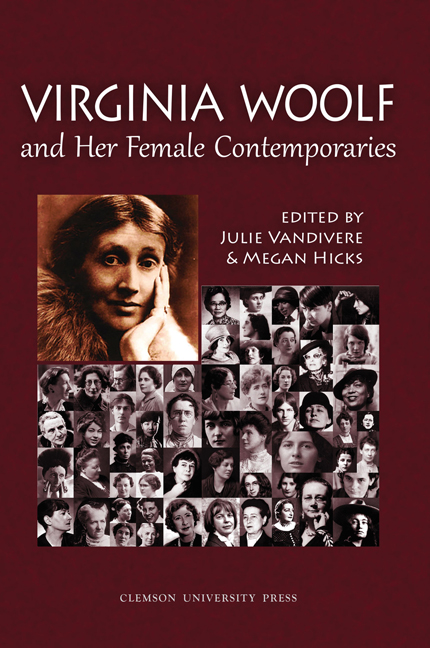Book contents
- Frontmatter
- Table of Contents
- Introduction
- Acknowledgments
- Abbreviations
- Who Are Virginia Woolf's Female Contemporaries?
- Virginia Woolf's Cultural Contexts
- Virginia Woolf's Contemporaries Abroad
- Virginia Woolf's Contemporaries at Home
- “The Squeak of a Hinge”: Hinging and Swinging in Woolf and Mansfield
- “People must marry”: Queer Temporality in Virginia Woolf and Katherine Mansfield
- The Weight of “Formal Obstructions” and Punctuation in Mrs. Dalloway and Pointed Roofs
- Advise and Reject: Virginia Woolf, the Hogarth Press, and a Forgotten Woman's Voice
- Florence Melian Stawell and Virginia Woolf: Home-front Experience, The Price of Freedom, and Patriotism
- Intimations of Cosmic Indifference in Virginia Woolf 's Orlando and Olive Moore's Spleen
- “Could I sue a dead person?”: Rebecca West and Virginia Woolf
- Splintered Sexualities in Rebecca West's The Return of the Soldier, Virginia Woolf 's Mrs Dalloway, and Sylvia Townsend Warner's “A Love Match”
- Sexual Cryptographies and War in Virginia Woolf 's Between the Acts and Elizabeth Bowen's The Heat of the Day
- Tribute to Jane Marcus
- Notes on Contributors
- Conference Program 223
Intimations of Cosmic Indifference in Virginia Woolf 's Orlando and Olive Moore's Spleen
from Virginia Woolf's Contemporaries at Home
- Frontmatter
- Table of Contents
- Introduction
- Acknowledgments
- Abbreviations
- Who Are Virginia Woolf's Female Contemporaries?
- Virginia Woolf's Cultural Contexts
- Virginia Woolf's Contemporaries Abroad
- Virginia Woolf's Contemporaries at Home
- “The Squeak of a Hinge”: Hinging and Swinging in Woolf and Mansfield
- “People must marry”: Queer Temporality in Virginia Woolf and Katherine Mansfield
- The Weight of “Formal Obstructions” and Punctuation in Mrs. Dalloway and Pointed Roofs
- Advise and Reject: Virginia Woolf, the Hogarth Press, and a Forgotten Woman's Voice
- Florence Melian Stawell and Virginia Woolf: Home-front Experience, The Price of Freedom, and Patriotism
- Intimations of Cosmic Indifference in Virginia Woolf 's Orlando and Olive Moore's Spleen
- “Could I sue a dead person?”: Rebecca West and Virginia Woolf
- Splintered Sexualities in Rebecca West's The Return of the Soldier, Virginia Woolf 's Mrs Dalloway, and Sylvia Townsend Warner's “A Love Match”
- Sexual Cryptographies and War in Virginia Woolf 's Between the Acts and Elizabeth Bowen's The Heat of the Day
- Tribute to Jane Marcus
- Notes on Contributors
- Conference Program 223
Summary
First, a passage to set the tone (one that should be familiar):
With the sound of the sea in their ears, vines, meadows, rivulets about them, they [i.e., the ancient Greeks] are even more aware than we are of a ruthless fate. There is a sadness at the back of life which they do not attempt to mitigate. Entirely aware of their own standing in the shadow, and yet alive to every tremor and gleam of existence, there they endure, and it is to the Greeks that we turn when we are sick of the vagueness, of the confusion, of the Christianity and its consolations, of our own age. (E4: 50–51)
Second, a summary of my position and purpose: The novels of Virginia Woolf and Olive Moore glimpse and occasionally enact a disquieting—what I have come to call a cosmic—indifference to human lives, cultures, languages, pleasures, pains, values, and concerns. This indifference, this non-attitude of nothingness, is not mitigated, neither overcome nor counter-acted. It, and the “ruthless fate” it implies, lingers in the background of their writings: an elegant, sublime, threatening, and seductive point of view that is unmoved by violence, death, and cruelty. Far from brightening this disconcerting background, my conclusion suggests that our novelists learn something by imagining their way into this void, using it as a critical optic for glancing at what they, what we, what “one cannot not want” (Spivak 47). It keeps coming back to me, this clause: “There is a sadness at the back of life.…” It points, quite directly I think, at the nothing against which we fortunate creatures have collectively erected all kinds of vague, alluring, evolving, and self-important consolations. This sadness is sad insofar as it saddens us. In itself, it is quite ruthless (because intentionless, literally mindless), a shadowy, cosmic agitation of nonconscious tremors and gleams.
The clause (I repeat) keeps coming back to me, and I am not sure why.
- Type
- Chapter
- Information
- Virginia Woolf and Her Female Contemporaries , pp. 183 - 188Publisher: Liverpool University PressPrint publication year: 2016

